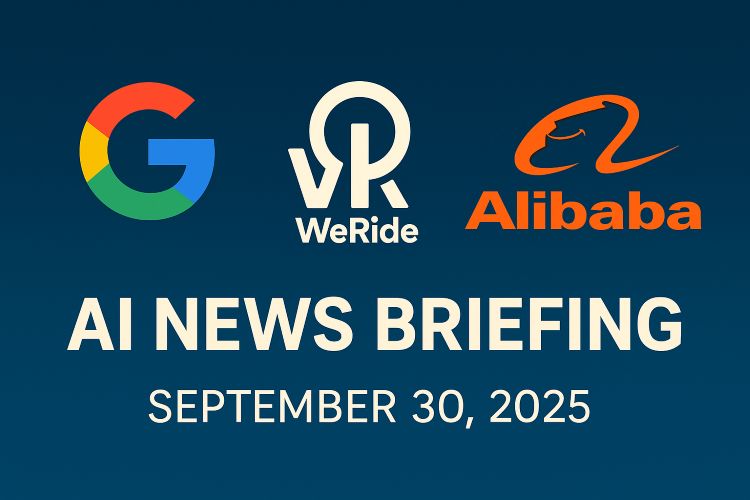AI Navigation
- articleAI Trends
- lightbulb_2AI Tips
- assistant_navigationAI Navigation
- heatHot Articles
- emergency_heat_2Hot Tips
- format_list_numberedPrompt Formatter
- psychologyTest Center(RPI)
September 30, 2025 · 24-Hour AI Briefing: Google’s $24.5M Settlement, WeRide Wins Belgium L4 License, Alibaba Brings in Top AI Scientist
In the past 24 hours, three major developments have reshaped the conversation around AI and tech: Google’s multi-million settlement with former President Trump, WeRide securing Belgium’s first federal L4 autonomous driving license, and Alibaba bringing in a world-renowned AI scientist to accelerate its AI strategy. These stories highlight the ongoing interplay between politics, industry, and talent in shaping the AI landscape. Here’s IAISeek’s roundup with commentary:

1. Google Pays $24.5M to Settle Trump Lawsuit
Google agreed to pay $24.5 million to settle former President Trump’s lawsuit accusing YouTube of illegal censorship by banning his channel. Settlement details show that $22 million will go toward the White House’s new banquet hall construction project (Trust for the National Mall), while the remaining $2.5 million will be distributed among other plaintiffs. YouTube did not admit to any wrongdoing or liability and will not alter its product or content moderation policies as part of the settlement.
Commentary:
Does this represent yet another compromise between tech giants and political power? On one side is free speech, on the other platform responsibility. For now, Google bears the cost. While YouTube maintains its policies, the settlement adds another layer to the global debate over platform neutrality and regulatory boundaries.
2. WeRide Secures Belgium’s First L4 Autonomous Driving License
WeRide, a global leader in autonomous driving technology, now operates 150 robotaxis in the Middle East. Its autonomous minibus Robobus has officially obtained Belgium’s first federal L4 autonomous driving license. This makes WeRide the only tech company worldwide with autonomous driving licenses in seven countries: Belgium, China, France, UAE, Saudi Arabia, Singapore, and the U.S.
Commentary:
WeRide’s footprint now spans Asia, North America, Europe, and the Middle East. The Belgian federal government’s L4 license allows vehicles to operate with “high automation” in designated areas, without human driver intervention. Still, commercialization faces challenges: regulatory fragmentation (such as EU data privacy rules), local adaptation, and building user trust. Achieving cost control and safe, scalable operations across different countries remains a long-term test.
3. Leading Scientist Xu Zhuhong Joins Alibaba’s Tongyi Team
Renowned AI scientist and IEEE Fellow Xu Zhuhong has joined Alibaba’s Tongyi team, focusing on multimodal interaction models. The move is described as a routine internal transfer within the Alibaba Group.
Commentary:
Xu Zhuhong, a tenured professor at Singapore Management University and founding head of Salesforce’s Asia Research Institute, has significantly influenced global large model development with his work on low-cost multimodal pretraining strategies. His transfer signals Alibaba’s strategic acceleration in consumer-facing AI. Emphasizing “internal transfer” suggests that Alibaba is aligning resources across DAMO Academy, Alibaba Cloud, Tongyi Lab, and Taotian to optimize talent and resource integration.
Conclusion
From Google’s legal settlement to WeRide’s cross-continental expansion and Alibaba’s strategic talent reshuffle, today’s AI developments reveal the multifaceted interplay of politics, markets, and human capital. The future of AI will be shaped not just by algorithms and chips, but also by governance, localization, and talent mobility.
For more cutting-edge AI updates, business insights, and tech trends, visit:
IAISeek Official Site
Want to catch up on other major AI events from the past 72 hours? Read more here:
AI & Tech Weekly (Sep 22–26): NVIDIA’s $100B Bet on OpenAI, TikTok’s Low Valuation, Quantum Finance Breakthrough
September 27, 2025 · 24-Hour AI Briefing: TikTok’s $14B Valuation Shock, Apple Tests Veritas, and TeraWulf’s $3B Data Center Expansion